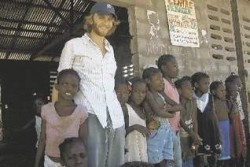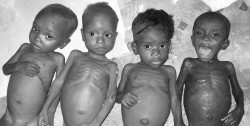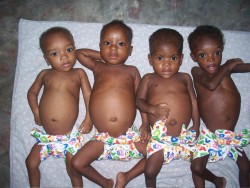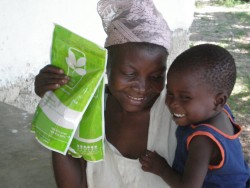 Tom Stehl with children in Haiti. |
Long before the devastating earthquake rocked Haiti on Jan. 12, Tom Stehl, BN’01, was saving the lives of starving Haitian children as coordinator of operations for Meds & Food for Kids (MFK Haiti).
The nonprofit group, based in St. Louis, runs a factory in Cap-Haitien that produces and distributes a nutritent-packed food for malnourished children. The food, called Medika Mamba, means “peanut butter medicine” in Haitian Creole. It consists of peanuts, milk powder, vegetable oil, sugar and a vitamin/mineral compound.
“There were 250,000 malnourished kids in Haiti before the earthquake, and we have no good estimate as to how many more there will be,” said Stehl, who was a National Alumni Scholar at Drake.
“We’re already seeing more kids streaming into nutrition clinics now that we’re into the second wave of the crisis,” he added. “This was a catastrophe before the earthquake. It’s off the charts now.”
MFK Haiti was relatively unscathed by the quake. Its factory in Cap-Haitien, about 150 miles north of Port-Au-Prince, was not damaged and continues to produce Medika Mamba.
However, a wall did collapse at MFK’s distribution center in Port-au-Prince, injuring the supervisor there. The supervisor managed to get to Miami for medical treatment and expects to return to work in Haiti soon, Stehl said.
 Four emaciated orphans at an orphanage. |
Other staff members have been helping to distribute the 11,000 pounds
of Medika Mamba stored at the distribution center to clinics and
hospitals despite continuing disruption of transportation and
communication systems.
The only other casualty appears to be a container of raw materials
for Medika Mamba, valued at $80,000, which is missing from the
Port-au-Prince harbor.
Suppliers have pledged to replace the materials
free of charge, so Stehl is making arrangements to get the materials
into the bordering Dominican Republic and then to the factory in Haiti.
Stehl, who has made 20 trips to Haiti in the last two years, was in St. Louis when the quake struck.
 The orphans appear far healthier after six weeks of eating Medika Mamba. |
Haitian children tug on Stehl’s heartstrings
“Part of my heart is in Haiti,” he said. “It’s hard not to be on
the ground, but this is an opportunity for us to share our story of
Medika Mamba and Meds and Food for Kids when people care about Haiti.”
Stehl, who earned an MBA and a master’s degree in social work at Washington University in St. Louis, helped develop a microbiology lab at the Haitian factory to ensure the safety of food produced there.
He also arranged for an international food safety audit and learned last December that MFK Haiti had passed. This means organizations such as UNICEF and Doctors Without Borders will now consider purchasing and distributing Medika Mamba.
“The audit was a necessary step that will enable us to treat thousands more malnourished children each year,” he said.
In addition, Stehl has secured grants from the World Bank and other agencies to expand production. He was working to raise $1.5 million for a new and larger factory when the earthquake struck. Those plans, he said, are on hold while MFK Haiti copes with the aftermath of the quake.
A new factory would mean a boost to Haiti’s economy. MFK Haiti already employs more than 20 Haitians at its current factory and buys much of the raw materials for Medika Mamba from Haitian farmers.
“While we’re serving the immediate needs of starving children, we’re also contributing to the economic development of Haiti,” Stehl said. “Haiti needs more than just rescue. Rescue only begets rescue.
“You must have a long-term focus and that’s why — against great adversity and all odds — we make Medika Mamba in Haiti. Not because it’s easy, but because it’s hard and it’s what is needed.
 Medika Mamba brings smiles to the faces of a mother and child. |
Medika Mamba: a key to Haiti’s economic, agricultural development
“This product is more than just rescue or relief,” he added. “It’s a
catalyst for economic and agricultural development in a country that
desperately needs it.”
Stehl said he’s heartened by the outpouring of support for Haiti,
but concerned that it may not be sustained long enough to get the
country back on its feet.
“This earthquake has set Haiti back a generation,” he added. “Haiti
was already the poorest country in the Western Hemisphere. This
interest in Haiti, I hope, is sustained, although I fear it won’t be. I
would ask others to just keep Haiti in their minds and hearts because
the country’s problems are not going to go away when the cameras leave.”
In an effort to keep generating support for Haiti, several Drake
student groups are organizing a series of fundraising events this week. The activities include a concert,
dodgeball tournament, karaoke auction night and sales of T-shirts.
“All the proceeds are going to Meds and Foods for Kids,” said Kovie Biakolo, one of the student leaders planning the events.
“In talking with Tom Stehl, I learned about the program and how the group had been helping Haiti prior to the
earthquake. That was really moving. Also, the idea of Medika Mamba as a therapeutic food for malnourished children is fascinating.
“We don’t have a specific goal for the fundraising,” she added, “but we want to raise as much as possible because the need is so great.”
For more information about MFK Haiti, call 314-420-1634. Donations
may be sent to Meds and Food for Kids, 4488 Forest Park Ave., Suite
230, St. Louis, MO 63108.

